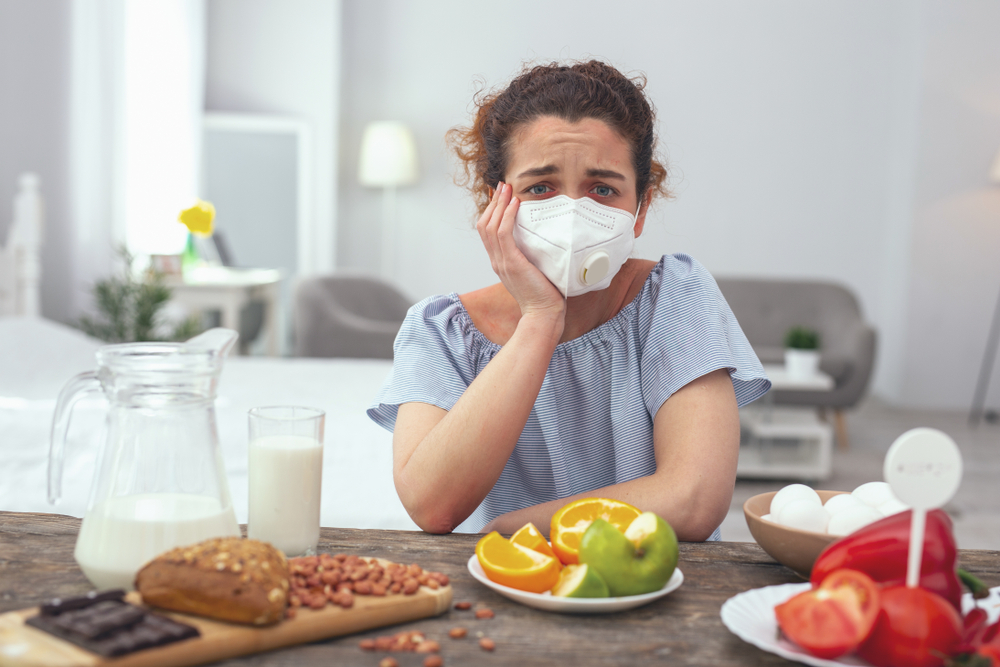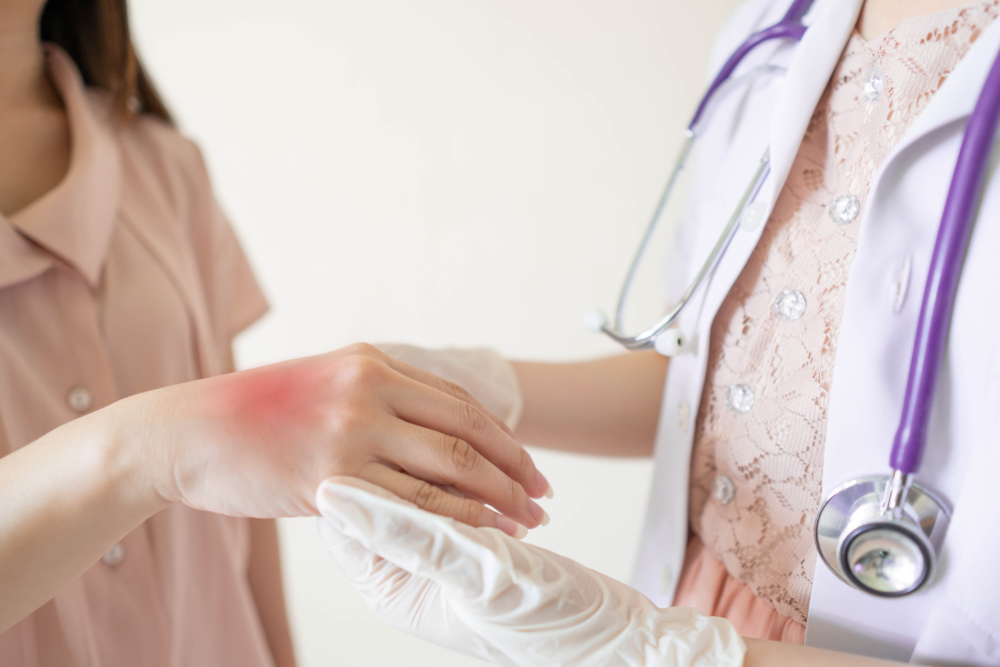
Food Allergy Treatment
Food allergies are a common and potentially dangerous condition affecting millions of people worldwide. It is crucial to understand the symptoms, management, and treatment options available for those suffering from food allergies. The allergy providers at Penn Medicine Becker ENT & Allergy in New Jersey and Philadelphia help patients understand and manage their food allergies, giving them back their quality of life.
- Recognizing Symptoms of Food Allergies
- Managing the Symptoms of Food Allergies
- Treating Food Allergies with Immunotherapy
- The Benefits of Carefully Monitored Diet Changes for Allergy Patients
- Learning Self-Care Strategies to Manage Severe Reactions
- Preventing Food Allergy Episodes
- Treatment Options for Food Allergies
- The Benefits of Seeking Professional Treatment for Food Allergies
- Frequently Asked Questions about Food Allergy
Recognizing Symptoms of Food Allergies
Food allergy symptoms can affect various systems of the body, including the skin, respiratory tract, and gastrointestinal tract. Reactions can range from mild to severe and may include hives, difficulty breathing, abdominal pain, and even life-threatening anaphylaxis. Recognizing the signs of an allergic reaction and seeking prompt medical attention is crucial for managing food allergies.
Symptoms of Skin Allergies
Skin allergies associated with food can present as hives, itching, swelling, and redness. These symptoms may appear within minutes to hours after consuming the allergen and can range from mild to severe.
Symptoms of Respiratory Allergies
Respiratory symptoms of food allergies can include wheezing, coughing, shortness of breath, and nasal congestion. In some cases, respiratory symptoms of food allergies can also lead to a severe and potentially life-threatening condition called anaphylaxis. Anaphylaxis can cause swelling in the throat and tongue, making it difficult to breathe, and can also cause a sudden drop in blood pressure. This condition requires immediate medical attention.
Symptoms of Gastrointestinal Allergies
Gastrointestinal symptoms of food allergies can include abdominal pain, nausea, vomiting, diarrhea, and bloating. These symptoms typically occur within a few hours of ingesting the allergen and can vary in severity.
Managing the Symptoms of Food Allergies
Managing food allergy symptoms involves avoiding the allergen, and taking medications as needed. Involving healthcare providers and caregivers is also an important part of managing symptoms. Educate the caregivers about food allergies: what foods to avoid, how to read food labels, and how to recognize and respond to an allergic reaction to ensure the child’s safety.


Treating Food Allergies with Immunotherapy
Allergen-specific immunotherapy, such as oral immunotherapy or sublingual immunotherapy, may be recommended to help desensitize an individual’s immune system. This treatment works by gradually exposing the immune system to small amounts of allergenic food, which can help train the immune system to tolerate the food without triggering an allergic reaction.
Immunotherapy can be a treatment option for some food allergies, such as peanut allergies in children ages 4-17. The FDA-approved oral immunotherapy drug Peanut Allergen Powder-dnfp (Palforzia) can help desensitize children with confirmed peanut allergies, reducing the risk of severe reactions. Immunotherapy should be administered under the supervision of a qualified healthcare professional.
At Penn Medicine Becker ENT & Allergy, we do not administer immunotherapy for food allergies; however, we are happy to assist with helping you find a provider in your network who does.
The Benefits of Carefully Monitored Diet Changes for Allergy Patients
Diet changes, such as implementing an elimination diet, can help identify specific food triggers and manage food allergy symptoms. Removing suspect foods for 1-2 weeks and then reintroducing them one at a time can help pinpoint the cause of allergic reactions. Consulting with a healthcare provider or dietitian for guidance on nutritional supplements and creating a balanced diet is essential for those with food allergies.

Schedule your consultation
Learning Self-Care Strategies to Manage Severe Reactions
Living with food allergies requires developing self-care strategies to manage severe reactions effectively. Connecting with others who have food allergies, educating oneself about their condition, being prepared for emergencies, and creating a safe environment are essential coping mechanisms. Carrying an epinephrine auto-injector and knowing how to use it can be lifesaving during an anaphylactic reaction.
Preventing Food Allergy Episodes
Preventing food allergy episodes involves vigilance in avoiding allergens, reading food labels, and being cautious at restaurants and social gatherings.
Cross-reactivity should also be considered, as individuals allergic to specific foods may react to related foods due to similar proteins found in both. For example, individuals allergic to peanuts may also react to other tree nuts or legumes, such as soybeans or lentils. Always check ingredient labels and be aware of possible cross-contamination risks in food manufacturing facilities. Being aware of potential cross-reactivity can help individuals with food allergies avoid additional triggers and minimize the risk of allergic reactions.
Involving caregivers, food allergy testing, and informing them about the child’s food allergies can help prevent allergic reactions.
Treatment Options for Food Allergies
There are various treatment options for food allergies, including medications and the use of epinephrine auto-injectors for a severe allergic reaction. Consulting with a healthcare professional is crucial to determine the most appropriate treatment plan for each individual.
Medications Used to Treat Food Allergies
Several medications can help manage food allergy symptoms, such as antihistamines, corticosteroids, and bronchodilators. Antihistamines block the effects of histamine release which can reduce swelling, itching, and hives, while corticosteroids can help to alleviate inflammation and swelling. Bronchodilators can help ease breathing difficulties by relaxing the airway muscles to improve breathing during an allergic reaction.
Epinephrine Auto-Injector for Severe Reactions
An epinephrine auto-injector is a crucial tool for individuals with severe food allergies, as it can quickly reverse the life-threatening symptoms of anaphylaxis. This life-saving tool has an expiration date, so keep that in mind. It is essential to carry an epinephrine auto-injector at all times and know how to use it correctly.

The Benefits of Seeking Professional Treatment for Food Allergies
Seeking professional treatment for food allergies can help individuals better understand their condition, identify specific food triggers, and develop an effective management plan. The allergy physicians at Penn Medicine Becker ENT & Allergy in New Jersey and Philadelphia can provide expert guidance, support, and treatment options tailored to each patient’s needs. By working with healthcare professionals, individuals with food allergies can improve their quality of life and minimize the risk of severe reactions.

Pick one of our convenient locations
for your Food Allergy Treatment
